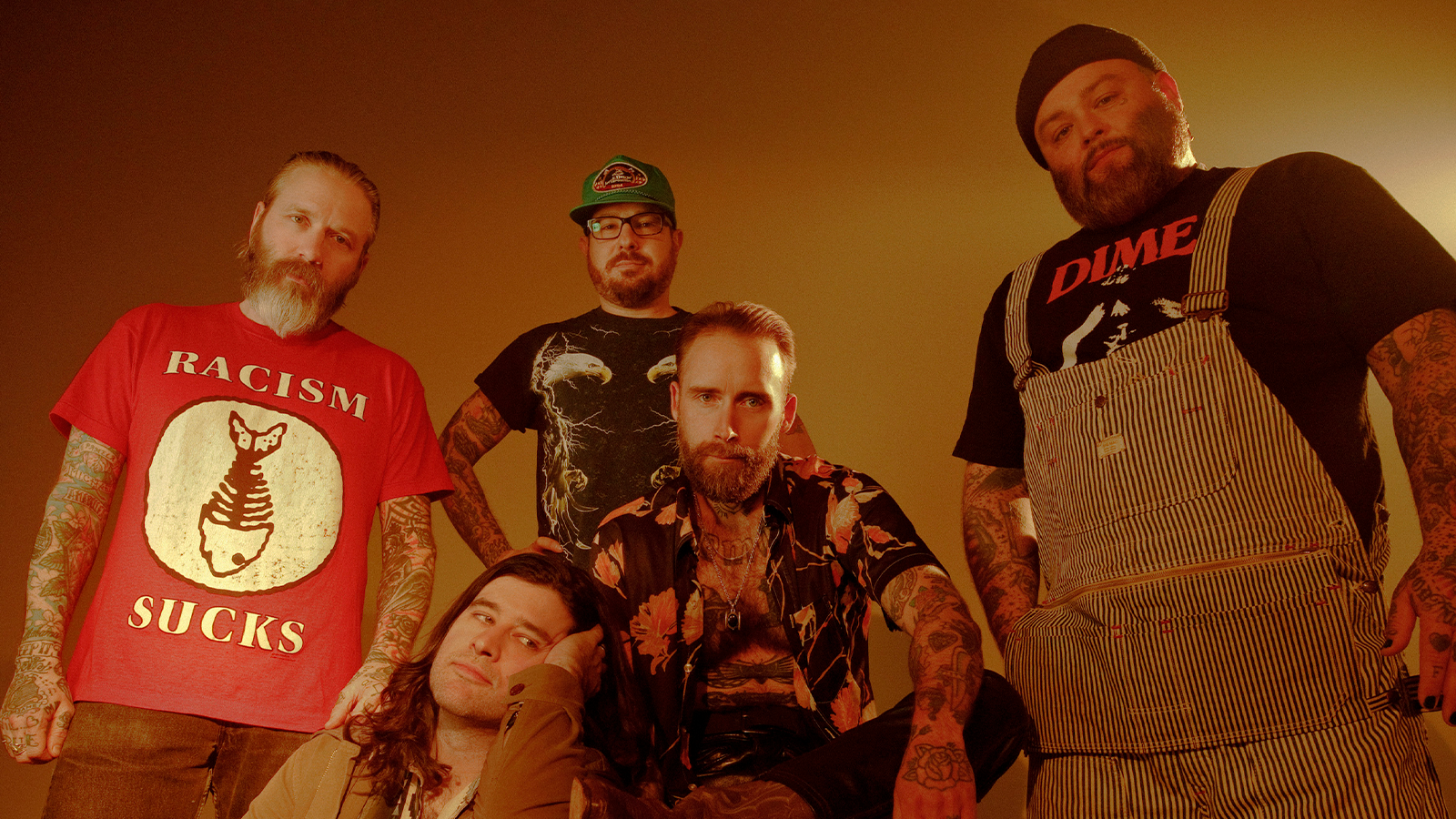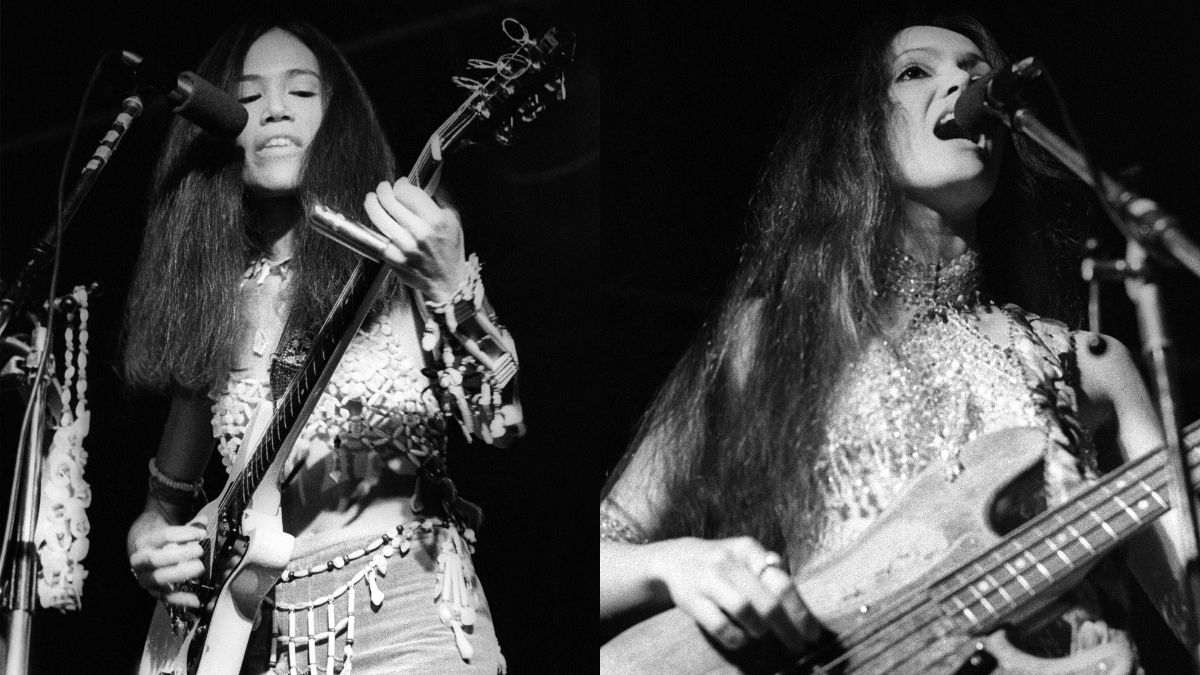Alexisonfire: “It’s a blessing and a curse that we make records this way”
We thought the day would never come, but Alexisonfire are finally back with a new album. Let’s dive right in

All the latest guitar news, interviews, lessons, reviews, deals and more, direct to your inbox!
You are now subscribed
Your newsletter sign-up was successful
There are fans of Alexisonfire who are younger than the gap between their last two studio albums. The Canadian post-hardcore legends released their fourth full-length effort, Old Crows / Young Cardinals, in 2009, two years before they prematurely dropped off the face of the earth. They reunited in 2015, but at the time, were hesitant to say whether new music was on the cards.
Standalone singles – ‘Familiar Drugs’ and ‘Complicit’ in 2019, and ‘Season Of The Flood’ in 2020 – sent fans into a frenzy thinking LP5 was finally inbound, but as frontman Dallas Green tells Australian Guitar, that was never the case. For all intents and purposes, Alexisonfire planned to release new music as it came to them, refusing to bind themselves to the pressures of a full album…
…And then the pandemic happened. With no opportunities to tour, travel or, for long stretches of the past two years, go outside at all, the band turned to songwriting in abundance, and by the time they could reconvene, there was a whole new record of material to be hashed out. And out, did they hash. The end result is Otherness, a record that Alexisonfire say represents the band better than any of their first four.
So goes their mission statement: “A continuous thread through the fabric of Alexisonfire is the state of otherness. Otherness drew us all to spaces where a band like this could be formed. We attract the type of individuals that have all felt the sensation of being strange or unique. Perceived or otherwise, otherness has followed us through childhood, adolescence, and into our adult lives. It drives our tastes and proclivities. It bonds us with ourselves and others. And make no mistake, even at our most domestic and mundane moments, we are true outliers.”
So, 13 years since the last one, Alexisonfire are back with a new album. To celebrate, we got down to the wire with Green about all things Otherness.
How does this record encapsulate Alexisonfire’s evolution since 2009?
When we started working on the songs, we realised that we only sound like Alexisonfire, y’know? We don’t sound like anybody else. So there wasn’t this idea of, “Oh, let’s have a conversation about what we’re going to sound like now.” We just started writing songs. We’d always come [into a session] and talk about what songs we liked, and what records we were listening to at the time – and that sort of seeps into the songs a little bit, but I think it does more subconsciously than from an actual sound perspective.
When we started making this record, we were all getting really jazzed about what we were creating. And somewhere along the way, we discovered a new version of us, y’know? We realised that we didn’t have to be tied to any nostalgia, we didn’t have to find whatever was invigorating us when we were kids – we could just be whatever we are in this moment.
All the latest guitar news, interviews, lessons, reviews, deals and more, direct to your inbox!
Well for the past seven years, you’ve sworn that this reunion was anything but a nostalgia trip or a cash grab. So that’s just putting your money where your mouth is, right?
Yeah, and I mean, that’s the blessing and the curse of this band, that we make records this way. I don’t feel like we sound like anybody else, so it’s kind of hard to describe us – you either like it or you don’t, y’know? But I think we definitely unlocked something new in our sound, and in how we approach – and can approach – making a record, because of our experience. Most of us kept making music while we were apart, whether we were playing with each other or doing our own things. I’ve done nothing but write songs and make records. Wade has been making film scores and starting a hundred of his own bands…
In a way, it felt like we were making the first record of a new band. We didn’t have a record deal, we didn’t have a team, and we didn’t put any pressure on ourselves to follow something up – we didn’t just come off tour for another record, and we weren’t trying to come up with something we could take out on the road. It was like we had that sense of youthful exuberance again, with no care in the world apart from, “Isn’t this incredible, that we get to make music together?”
I think that really informed the process. We’d go into the studio and be like, “Hey, let’s try some three-part harmonies today! Let’s put a Moog synthesiser on this song. Let’s have songs that are super beautiful, with no screaming, and then let’s have some of the heaviest songs we’ve ever written.” There were no rules. And that’s what the record sounds like – it just sounds like the five of us being super excited about our ability to create.
Having done those four City And Colour records and You+Me, had you developed any new techniques or playing styles you wanted to incorporate into Alexisonfire?
Well, it was great that Wade and I produced the record ourselves, because we weren’t tied to anybody else’s approach to making a rock record. We used our own experiences to make it sound the way we wanted it to sound. And one of those really fun things was that we made the whole album using these little combo amps. We’d never made an Alexis record like that before, but it was something we really wanted to do. Because we had written all the songs with combo amps, then demoed them with combo amps, so we were like, “Let’s just keep using these – we’ll figure out how to make it heavy.” Y’know, you don’t always need to have 16 Marshalls lined up to make something sound heavy.
And we were very adamant about making this a human record. I think with our old records, they sound pretty raw, and we made them as rawly as we could, but we were young, and we still did the whole studio process, like, “Let’s record the beds together, but then do a bunch of overdubbing and go to the grid, quantise the drums…” All that bullshit. Whereas on this record, we didn’t do any of that. There’s overdubs, sure, but only because there’s so many f***ing layers of sound on the record, it would be impossible to do live. But the two main guitars, bass and drums that you hear are pretty much just me, Jordan, Wade and Steele playing together.
Live in the room?
Live in the room, and looking each other dead in the eyes. Because I think when we wrote the songs, we thought to ourselves, “We’re a good enough live band, we could make a record this way.” We wanted to capture all of the energy that we were feeling when we got back in a room together, because we hadn’t been able to play in so long. I think I definitely brought in some of my experience from making those City And Colour records a little bit more loosely.
You’ve got a little bit more freedom, when you’re making quieter music, to just sort of let the room speak. Whereas when you’re making super loud, aggressive music, you kind of want everything to be as tight as possible. But I think we all felt comfortable, and we know we’re good enough at our instruments and our craft, that we could either fix some of our mistakes later, or just leave them in because they worked for the songs.
What were some of the standouts in your guitarsenal?
Wade and I went berserk with pedals and different tones and all that stuff, but we both basically just used our practice amps. I used a Fender Blues Deville 4x10 from the ‘90s, which I’ve had as a practice amp since 2008, and I used a Garnet Revolution III, a 1x12, which is a Canadian amp from the ‘70s. And then Wade used two Princetons, and all the heavy tones came from tube screamers. I think my main overdrive pedal was a Greer Lightspeed. Our concept was, “What would it sound like if The Black Crowes made a punk-rock album?”

Ellie Robinson is an Australian writer, editor and dog enthusiast with a keen ear for pop-rock and a keen tongue for actual Pop Rocks. Her bylines include music rag staples like NME, BLUNT, Mixdown and, of course, Australian Guitar (where she also serves as Editor-at-Large), but also less expected fare like TV Soap and Snowboarding Australia. Her go-to guitar is a Fender Player Tele, which, controversially, she only picked up after she'd joined the team at Australian Guitar. Before then, Ellie was a keyboardist – thankfully, the AG crew helped her see the light…
